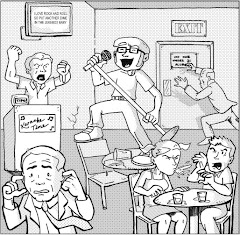Howard the Duck #13, June 1977, Marvel Comics
writer/editor: Steve Gerber
penciller: Gene Colan
inker: Steve Leialoha
letterer: Jim Novak
colorist: Jan Cohen
I lied.
Rummaging through my box of Comic Con swag, I discovered Howard the Duck #13, an issue I purchased with the A Comic A Day challenge in mind. I could imagine willingly reading an issue of Howard the Duck without some inane incentive, and fulfilling my personal challenge is as good as any. Actually, due in part to my disappointment in yesterday’s post, I’m grateful for the opportunity to analyze a book with such cult classic clout. Howard has quite a reputation.
Best known for his campy big screen debut, Howard was a brainchild of the psychedelic ‘70s, when a cigar-chomping duck wasn’t a premise for some self-published comic book endeavor, but rather a best seller for the one of the biggest comics publishers, arguably in its heyday, to boot. Seriously, without Howard, I wonder if characters like Cerebus or the Teenage Mutant Ninja Turtles would’ve been taken seriously . . . well, seriously enough to become franchises in their own right. The artistic phenomenon of personification, particularly involving animals, is a constantly developing beast (pardon the pun) that continues to set its own limits, from the animal-centric Sunday morning newspaper strips that eventually spawned the comic book format, to the wisecracking Mr. Ed, to the Bundys’ woe-is-me-monologue mutt. Every significant offering in this aspect of storytelling (if Married with Children can be dubbed significant) pushes the envelope for what the audience is willing to believe about the animal kingdom’s latent humanity. Howard the Duck not only pushed said envelope; he addressed it, mailed it, and asked for a receipt to assure that it reached its intended destination.
In this issue, Howard, believed to be a midget in a duck costume that just thinks he’s a duck, is in an asylum with his friend Wendy, whose visions of leather-clad, face make-up coated rock and rollers (that look an awful like, but are never identified as, KISS) materialize and persuade the hospital staff that she may be demon possessed. Look at that sentence again: in a single synopsis, I referenced a humanoid duck, midgets, KISS, and the delusions of a potential madwoman. No, this is not a pitch for the latest “celeb-reality” show on VH1. This is a concept that passed for a Marvel Comic, the House of Ideas. Join me in longing for the days before infinite crises and seemingly endless civil wars.
Apparently, this asylum’s staff took a page from the One Flew Over the Cuckoo’s Nest instructional handbook, because after a well-qualified demonologist (one Daimon Hellstrom, who I believe is a bit-player in the Marvel Universe), the warden opts to torture the supposed spirits from Wendy’s brittle soul. Enter the token brainwashing cult subplot. I thought Denny O’Neil had that shtick copyrighted in the ‘70s, but Gerber uses it here to establish the first of an at least two-part story. I’ll admit, I’m curious to see what happens next, which is a sign of success from a series’ first impression issue. Although the forced dialects were difficult to read, Gerber’s choppy tale is laced together by a fluidity of purpose; Howard’s reflective journey to find his place in our world is something to which everyone can relate.
How often have you been accused of being something that you’re not? Or, how often have you failed to live up to the expectations erected around you, about you? This is Howard the Duck, who, despite his alien appearance on our world, is a rather intelligent creature from an admittedly middle-class upbringing. The way Howard’s written, I’d expect to find him dwelling in a coffee shop more so than a duck pond, musing aloud of the futilities of existence rather than begging for a crust of bread. He’s smart, and surprisingly vulnerable. I vaguely remember his film from my youth, and I recall a cigar-sucking smart aleck. What was that I said about harsh judgments?
On a random note, a few cool lines from this issue:
HELLSTROM: The devil . . . too often receives credit for the creative behavior of humans.
Nice. Another one:
HOWARD: Even as a kid, I wanted to be a derelict. I liked the hours.
Chuckle worthy, at least. I can see why Howard’s fans stuck around. Gerber imbued the series with a charm beyond the first impression of goofiness one gets from when their eyes first fall on Howard the Duck.
As I said before, Howard set the stage for some of the most successful characters in comics, those animal-human hybrids that we don’t even think of as peculiar anymore. Indeed, no one thinks twice about a turtle swinging a katana blade, or a dry-humored dog crushing on his master’s wife on shows like Family Guy. However, Howard also raised the bar for epics based on introspection, like a mutant, modern Camus allegory with a touch comic book action and romance for flavor and pop culture validity. Howard shows his readers, in the face of life’s most difficult questions, one should tackle them head-on. You can never duck.
I’m sorry. That was bad. I told you, I’m making up for yesterday!
Thursday, September 14, 2006
Subscribe to:
Post Comments (Atom)



No comments:
Post a Comment